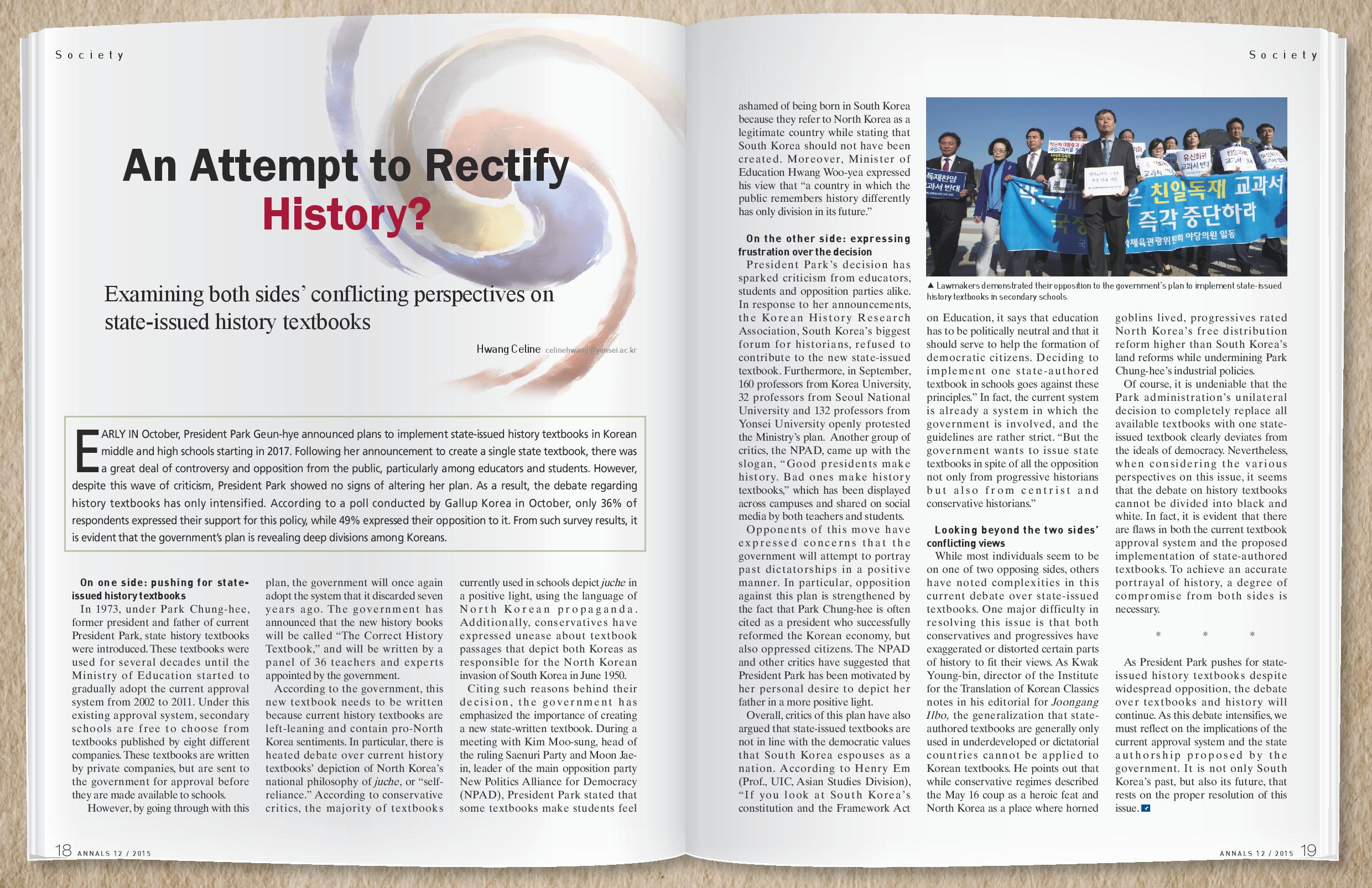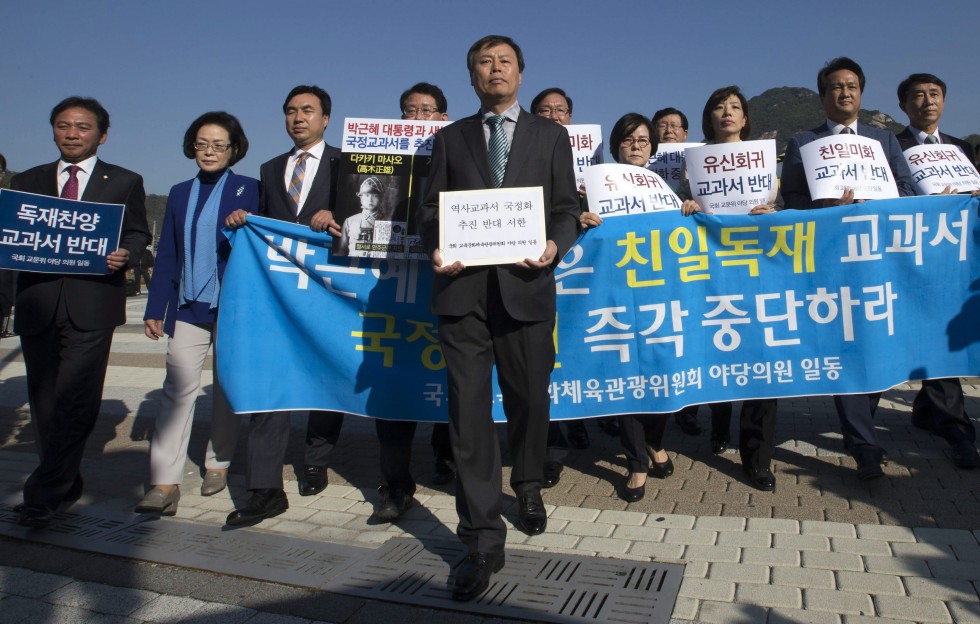Examining both sides’ conflicting perspectives on state-issued history textbooks


EARLY IN October, President Park Geun-hye announced plans to implement state-issued history textbooks in Korean middle and high schools starting in 2017. Following her announcement to create a single state textbook, there was a great deal of controversy and opposition from the public, particularly among educators and students. However, despite this wave of criticism, President Park showed no signs of altering her plan. As a result, the debate regarding history textbooks has only intensified. According to a poll conducted by Gallup Korea in October, only 36% of respondents expressed their support for this policy, while 49% expressed their opposition to it. From such survey results, it is evident that the government’s plan is revealing deep divisions among Koreans.
On one side: pushing for state-issued history textbooks
In 1973, under Park Chung-hee, former president and father of current President Park, state history textbooks were introduced. These textbooks were used for several decades until the Ministry of Education started to gradually adopt the current approval system from 2002 to 2011. Under this existing approval system, secondary schools are free to choose from textbooks published by eight different companies. These textbooks are written by private companies, but are sent to the government for approval before they are made available to schools.
However, by going through with this plan, the government will once again adopt the system that it discarded seven years ago. The government has announced that the new history books will be called “The Correct History Textbook,” and will be written by a panel of 36 teachers and experts appointed by the government.
According to the government, this new textbook needs to be written because current history textbooks are left-leaning and contain pro-North Korea sentiments. In particular, there is heated debate over current history textbooks’ depiction of North Korea’s national philosophy of juche, or “self-reliance.” According to conservative critics, the majority of textbooks currently used in schools depict juche in a positive light, using the language of North Korean propaganda. Additionally, conservatives have expressed unease about textbook passages that depict both Koreas as responsible for the North Korean invasion of South Korea in June 1950.
Citing such reasons behind their decision, the government has emphasized the importance of creating a new state-written textbook. During a meeting with Kim Moo-sung, head of the ruling Saenuri Party and Moon Jae-in, leader of the main opposition party New Politics Alliance for Democracy (NPAD), President Park stated that some textbooks make students feel ashamed of being born in South Korea because they refer to North Korea as a legitimate country while stating that South Korea should not have been created. Moreover, Minister of Education Hwang Woo-yea expressed his view that “a country in which the public remembers history differently has only division in its future.”
On the other side: expressing frustration over the decision
President Park’s decision has sparked criticism from educators, students and opposition parties alike. In response to her announcements, the Korean History Research Association, South Korea’s biggest forum for historians, refused to contribute to the new state-issued textbook. Furthermore, in September, 160 professors from Korea University, 32 professors from Seoul National University and 132 professors from Yonsei University openly protested the Ministry’s plan. Another group of critics, the NPAD, came up with the slogan, “Good presidents make history. Bad ones make history textbooks,” which has been displayed across campuses and shared on social media by both teachers and students.
Opponents of this move have expressed concerns that the government will attempt to portray past dictatorships in a positive manner. In particular, opposition against this plan is strengthened by the fact that Park Chung-hee is often cited as a president who successfully reformed the Korean economy, but also oppressed citizens. The NPAD and other critics have suggested that President Park has been motivated by her personal desire to depict her father in a more positive light.
Overall, critics of this plan have also argued that state-issued textbooks are not in line with the democratic values that South Korea espouses as a nation. According to Henry Em (Prof., UIC, Asian Studies Division), “If you look at South Korea’s constitution and the Framework Act on Education, it says that education has to be politically neutral and that it should serve to help the formation of democratic citizens. Deciding to implement one state-authored textbook in schools goes against these principles.” In fact, the current system is already a system in which the government is involved, and the guidelines are rather strict. “But the government wants to issue state textbooks in spite of all the opposition not only from progressive historians but also from centrist and conservative historians.”
Looking beyond the two sides’ conflicting views
While most individuals seem to be on one of two opposing sides, others have noted complexities in this current debate over state-issued textbooks. One major difficulty in resolving this issue is that both conservatives and progressives have exaggerated or distorted certain parts of history to fit their views. As Kwak Young-bin, director of the Institute for the Translation of Korean Classics notes in his editorial for Joongang Ilbo, the generalization that state-authored textbooks are generally only used in underdeveloped or dictatorial countries cannot be applied to Korean textbooks. He points out that while conservative regimes described the May 16 coup as a heroic feat and North Korea as a place where horned goblins lived, progressives rated North Korea’s free distribution reform higher than South Korea’s land reforms while undermining Park Chung-hee’s industrial policies.
Of course, it is undeniable that the Park administration’s unilateral decision to completely replace all available textbooks with one state-issued textbook clearly deviates from the ideals of democracy. Nevertheless, when considering the various perspectives on this issue, it seems that the debate on history textbooks cannot be divided into black and white. In fact, it is evident that there are flaws in both the current textbook approval system and the proposed implementation of state-authored textbooks. To achieve an accurate portrayal of history, a degree of compromise from both sides is necessary.
* * *
As President Park pushes for state-issued history textbooks despite widespread opposition, the debate over textbooks and history will continue. As this debate intensifies, we must reflect on the implications of the current approval system and the state authorship proposed by the government. It is not only South Korea’s past, but also its future, that rests on the proper resolution of this issue.

